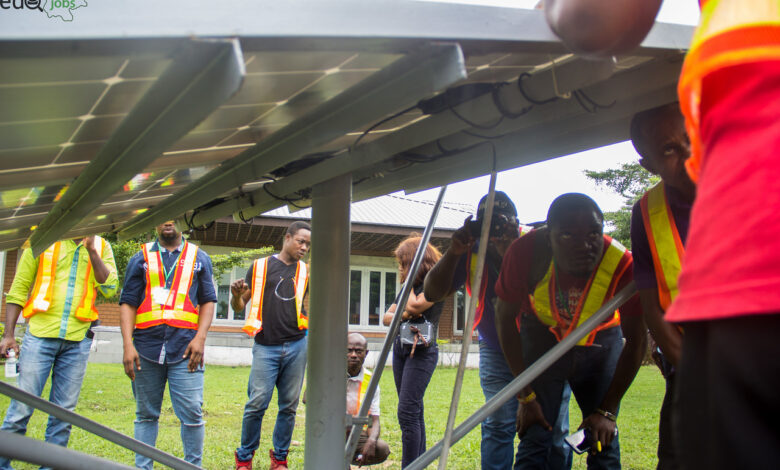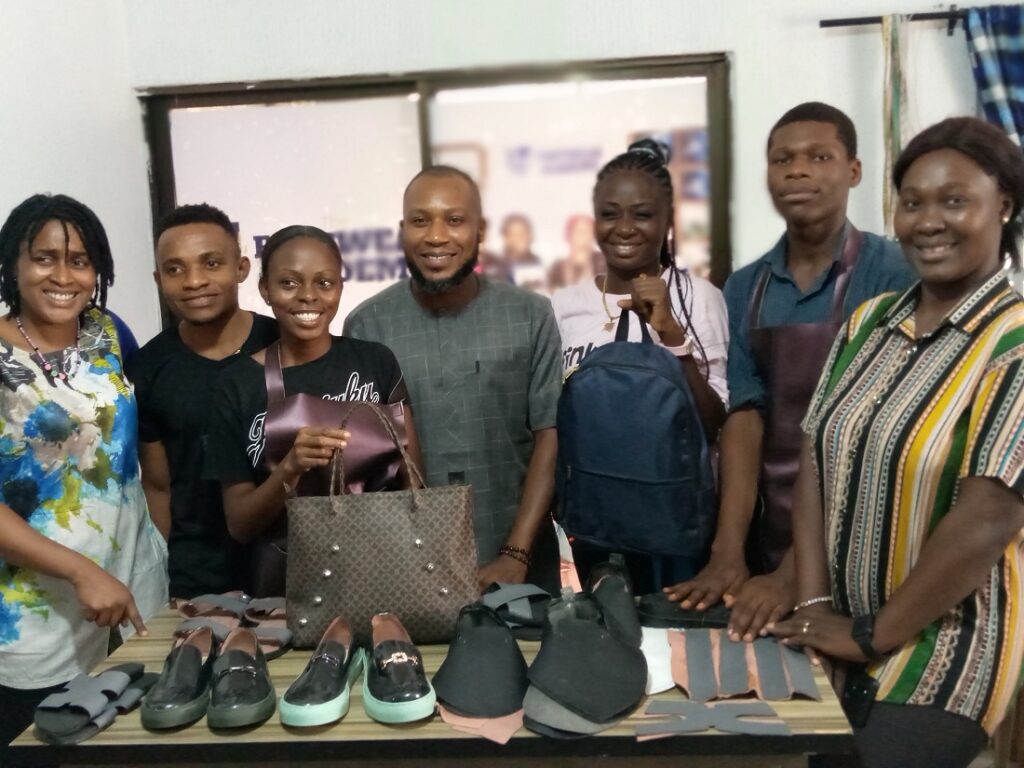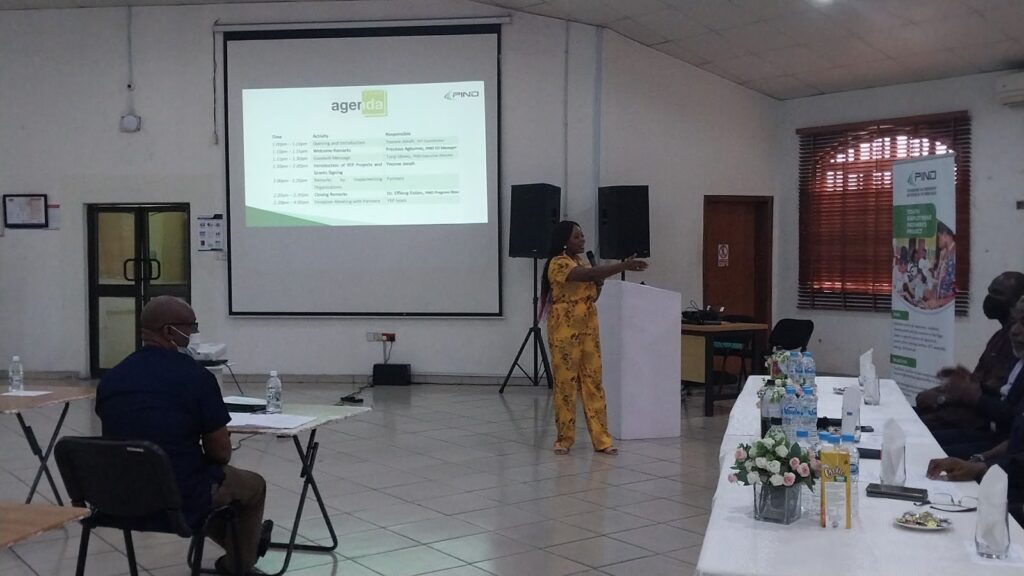This NGO Is Toeing A New Path To Tackle Unemployment In The Niger Delta And It’s Working
As youth unemployment in Nigeria’s oil-rich Niger Delta remains a challenge, a non-governmental organisation is trying a different approach to facilitating job security for vulnerable youth in the region.

Mary Ogbonna worked as a sales girl at the Aba International Market in Abia, Southeast Nigeria. But she wanted more out of life and saw the Youth Employment Pathways (YEP) as the perfect opportunity.
“Before the project, I had a life, but it was not the kind of life I dreamt of. I used to be one of those sales girls at the market in Aba to assist my aunty,” she said after taking part in the project’s first phase.
She is now a Google digital skills trainer, has worked as a market research journalist, and even co-founded a startup.
YEP is an initiative started by the Foundation for Partnership Initiative in the Niger Delta (PIND) to enhance youth employability and entrepreneurship.
Uduak Etuk, who got to know about the training through a Facebook post, is now an expert in woodwork. “The training has built me technically such that I use a computer system to do designs like some of my colleagues,” said Etuk, who is in Uyo, Akwa Ibom State. “The training has helped me a lot.”
According to her, money is no longer an issue. “I’m financially okay,” she boasted. “I have obtained my Post Graduate Diploma in Business Administration, and I have also been able to pay my rent.” She says her vision is to own a big, successful woodwork company.
Before he came across YEP training, Odinaka King from Enugu was unemployed. Though he was trained as a mobile phone engineer, he could not afford to buy his tools. King, who lives with speaking and hearing disabilities, learnt phone hardware and software repairs during the YEP training. He now owns a shop where he repairs phones and computers. “I can do many things with phones and laptops,” he said through an interpreter. “I’m grateful to PIND and Keep It Real Foundation.”
There are many more stories of beneficiaries who have acquired new skills through the YEP programme and thereafter established profitable businesses.
Once renowned as a hotbed for militancy and unemployment, Nigeria’s oil-rich Niger Delta region is pacing up to become one of the country’s hubs for young entrepreneurs.
Experts have argued that the region’s lack of access to economic opportunities is one of the leading causes of insecurity. “Youth unemployment in the Niger Delta remains challenging, and it is a driver of conflicts and youth restiveness in the region,” says Lady Chigozie Uche, a technical and educational trainer based in Abia State, Southeast Nigeria.
Lady Uche of Kiara Deluke Academy is one of YEP’s implementing partners and has witnessed the impacts of skills acquisition and empowerment on young people in the region.
Tunji Idowu, Executive Director of PIND Foundation, says the organisation strives to ensure that Niger Deltans have access to decent jobs, economic opportunities, and educational advancement—regardless of ability, age, gender, or location.
“We focus on supporting our most vulnerable populations through the empowerment of youth, women, persons with disabilities (PWDs), and populations in remote communities.”
According to Idowu, PIND Foundation has facilitated over 55,000 new full-time jobs and has leveraged ₦43.1 billion in investments into the agriculture and enterprise sectors for innovation and business growth.

YEP as a panacea
Implemented in two phases between Sept. 2017 and March 2021, the YEP project was piloted in three states in the Niger Delta region − Abia, Akwa Ibom, and Rivers − initially as the Niger Delta Youth Employment Pathways (NDYEP). Following its success in the pilot states, the project was extended to Delta State in 2021.
Nine implementing partners received ₦71 million ($173,170) in grant funding. They commenced the training for 586 youth in Delta during the year, enabling community members to guide and support one another.
The initiative was designed for the emerging sectors of agriculture, construction, finished leather, ICT, and renewable energy, which showed great potential for youth employment, according to the labour market assessments.
The pilot project was sponsored by Ford Foundation, during which 4,355 youths were trained and equipped with in-demand vocational skills in four growing sectors. Over 2,000 successful participants were subsequently linked to immediate waged employment or supported to establish their innovative enterprises.
Lady Uche was one of those involved in training the youths and believed that the project was a panacea to the twin problems of unemployment and restiveness in the Niger Delta.
“We trained about 350 youth in construction fields such as carpentry, masonry, electrical installations, and welding. Out of these, there are about 46 that are working on their own now,” she says.
“NDYEP has helped to address unemployment in the Niger Delta because these youth wouldn’t have been where they are now without this programme. It has changed their lives.”
Unemployment has always been linked to crimes and militancy in the Niger Delta region, and the project is helping to rehabilitate young people who used to engage in criminal activities.
“If you know where our centre is in Abia State, kidnapping is very high there, but many are coming out now to ask about such training opportunities. This is because they now know that learning a craft is far better than going into crime,” Lady Uche observes.
“It has reduced crimes and criminality because we can move freely here now. We have three ex-militants that joined our first training, and today, they are doing well.”
Like Lady Uche, Fabian Emmanuel, Executive Director of Azure Gold Development Foundation, also an implementing partner, believes that providing skills and job opportunities can resolve the youth unrest in the Niger Delta region.
“Militancy, criminality and unemployment are linked together. The fact that these people, who have been hitherto idle, have been taken out of unemployment and are engaged … They now become very busy, involved in productive activities. It has taken them out of those vices,” he says in an interview.
While admitting that more needs to be done to address unemployment in the region, he says many YEP beneficiaries are now earning income on their own, “which is a lot of achievement. There are a number of them who are also employing people as we speak. So the programme has helped immensely in job and wealth creation.”

The scale-up
Buoyed by the success recorded in its pilot phases and the potential for job creation as well as the reduction in crime, PIND Foundation, in March 2022, awarded over ₦104 million in grants to 12 implementing partners. The partners would train 1,000 youth in the Niger Delta region in various technical and soft vocational skills for at least six months, starting in May 2022.
With this development, the programme is getting replicated in Abia, Akwa Ibom, and Rivers states.
PIND’s Executive Director urged the partners to improve their service delivery to ensure the youth participants make early transitions to jobs and entrepreneurship.
Emmanuel believes the scale-up couldn’t have come at a better time.
“The programme ended in 2020, but we still have applicants who are interested. That’s why in this new project, the number of applications is far more than the previous ones. Having the results, the performance and income level of the participants, more people are aware and are more interested in being part of this programme,” he says.
The YEP model has allowed adequate time for participants to demonstrate competence in their chosen trades and has helped with job linkages and enterprise support — components lacking in many other skill acquisition programmes.
Implementing partners believe that the model should be sustained and replicated by governments in the region because of its effectiveness.
“If the project is sustained, it will take a lot of youth out of unemployment. It will additionally create vastly trained artisans, one of our problems in the Niger Delta,” Emmanuel says.
His Foundation, based in Akwa Ibom, South-south Nigeria, trained about 180 participants in the construction sector. “We are going to train 70 in this scale-up stage, but we are onboarding 80 trainees because of the large number of those interested in the training.”
On his part, Idowu called on the state authorities to complement PIND’s efforts by adopting the NDYEP model and further scaling it up to cater to the youth in the region.
“Although a lot is still being expected from the Niger Delta state governments, efforts such as from NDYEP will continue to pose evident examples for replication,” he says.
Support Our Journalism
There are millions of ordinary people affected by conflict in Africa whose stories are missing in the mainstream media. HumAngle is determined to tell those challenging and under-reported stories, hoping that the people impacted by these conflicts will find the safety and security they deserve.
To ensure that we continue to provide public service coverage, we have a small favour to ask you. We want you to be part of our journalistic endeavour by contributing a token to us.
Your donation will further promote a robust, free, and independent media.
Donate HereStay Closer To The Stories That Matter




